A Report on Retailers' Ethical Responsibilities & CSR in India
VerifiedAdded on 2023/06/13
|11
|3934
|242
Report
AI Summary
This report evaluates the ethical responsibilities of retailers who source goods from Indian factories, particularly in light of the documentary "Blood, Sweat & T-shirts." It discusses the ethical considerations within the retail industry, emphasizing the importance of retailers taking responsibility for the well-being of workers in their supply chains. The report applies the ethical theory of Utilitarianism to analyze whether the actions of retailers align with ethical standards, concluding that exploiting workers for profit is unethical. It also explores the concept of Corporate Social Responsibility (CSR) and its relevance to the retail sector, advocating for retailers to adopt a broad view of CSR that prioritizes the well-being of workers and sustainable practices. The report highlights the challenges of maintaining ethical standards in the face of globalization, competition, and the demand for fast fashion, while emphasizing the need for transparency and accountability in supply chain management. Ultimately, it urges retailers to ensure fair labor practices and decent working conditions throughout their supply networks, promoting a more ethical and responsible approach to business.
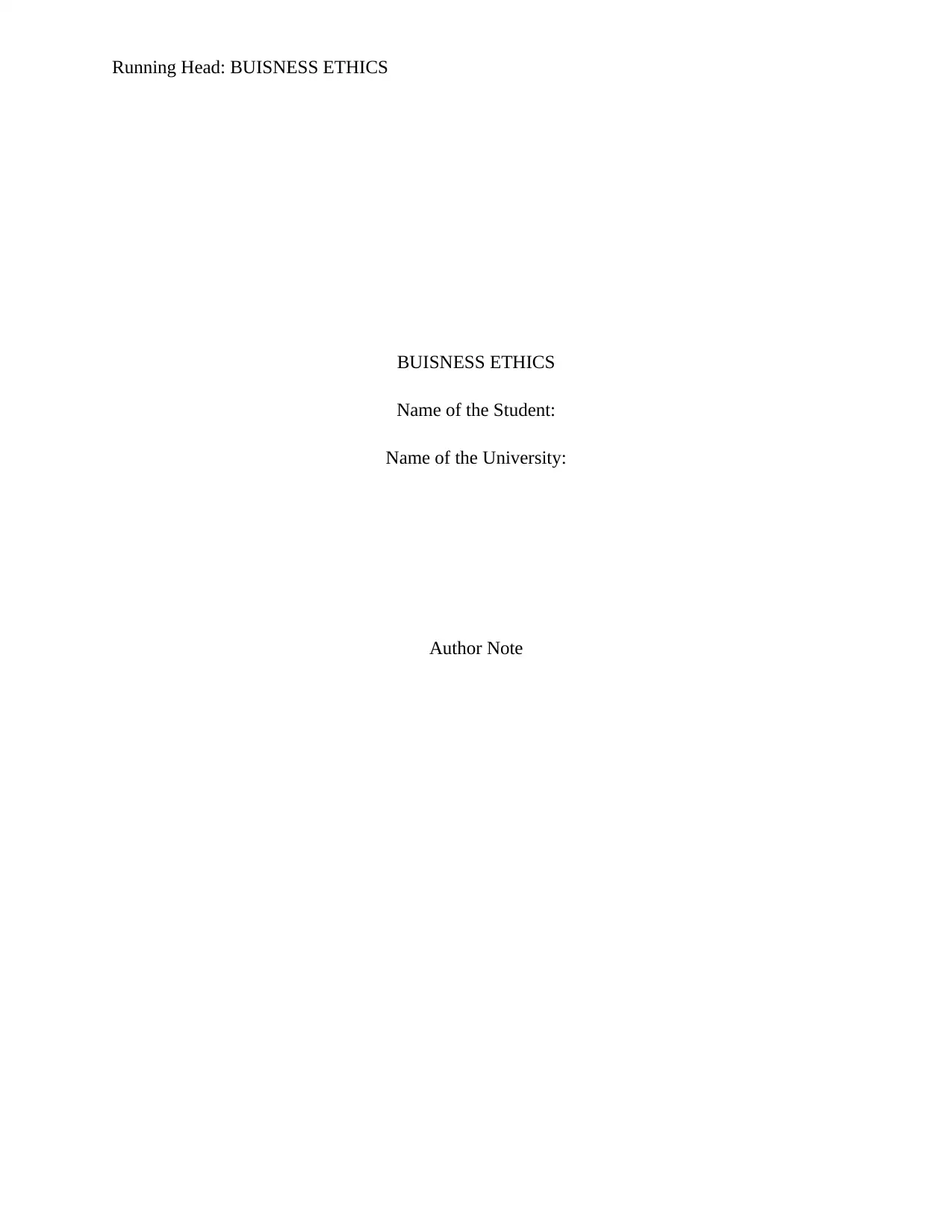
Running Head: BUISNESS ETHICS
BUISNESS ETHICS
Name of the Student:
Name of the University:
Author Note
BUISNESS ETHICS
Name of the Student:
Name of the University:
Author Note
Paraphrase This Document
Need a fresh take? Get an instant paraphrase of this document with our AI Paraphraser
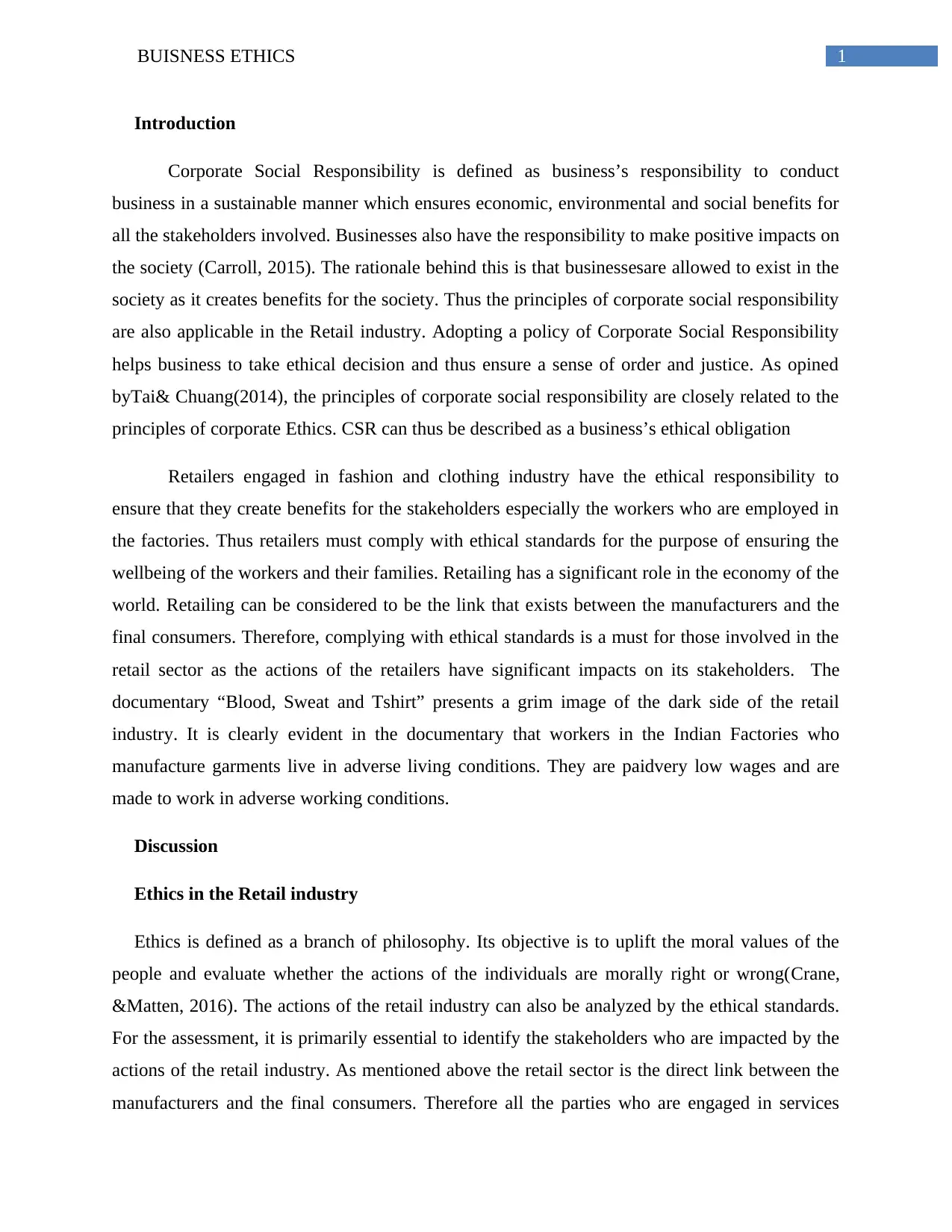
1BUISNESS ETHICS
Introduction
Corporate Social Responsibility is defined as business’s responsibility to conduct
business in a sustainable manner which ensures economic, environmental and social benefits for
all the stakeholders involved. Businesses also have the responsibility to make positive impacts on
the society (Carroll, 2015). The rationale behind this is that businessesare allowed to exist in the
society as it creates benefits for the society. Thus the principles of corporate social responsibility
are also applicable in the Retail industry. Adopting a policy of Corporate Social Responsibility
helps business to take ethical decision and thus ensure a sense of order and justice. As opined
byTai& Chuang(2014), the principles of corporate social responsibility are closely related to the
principles of corporate Ethics. CSR can thus be described as a business’s ethical obligation
Retailers engaged in fashion and clothing industry have the ethical responsibility to
ensure that they create benefits for the stakeholders especially the workers who are employed in
the factories. Thus retailers must comply with ethical standards for the purpose of ensuring the
wellbeing of the workers and their families. Retailing has a significant role in the economy of the
world. Retailing can be considered to be the link that exists between the manufacturers and the
final consumers. Therefore, complying with ethical standards is a must for those involved in the
retail sector as the actions of the retailers have significant impacts on its stakeholders. The
documentary “Blood, Sweat and Tshirt” presents a grim image of the dark side of the retail
industry. It is clearly evident in the documentary that workers in the Indian Factories who
manufacture garments live in adverse living conditions. They are paidvery low wages and are
made to work in adverse working conditions.
Discussion
Ethics in the Retail industry
Ethics is defined as a branch of philosophy. Its objective is to uplift the moral values of the
people and evaluate whether the actions of the individuals are morally right or wrong(Crane,
&Matten, 2016). The actions of the retail industry can also be analyzed by the ethical standards.
For the assessment, it is primarily essential to identify the stakeholders who are impacted by the
actions of the retail industry. As mentioned above the retail sector is the direct link between the
manufacturers and the final consumers. Therefore all the parties who are engaged in services
Introduction
Corporate Social Responsibility is defined as business’s responsibility to conduct
business in a sustainable manner which ensures economic, environmental and social benefits for
all the stakeholders involved. Businesses also have the responsibility to make positive impacts on
the society (Carroll, 2015). The rationale behind this is that businessesare allowed to exist in the
society as it creates benefits for the society. Thus the principles of corporate social responsibility
are also applicable in the Retail industry. Adopting a policy of Corporate Social Responsibility
helps business to take ethical decision and thus ensure a sense of order and justice. As opined
byTai& Chuang(2014), the principles of corporate social responsibility are closely related to the
principles of corporate Ethics. CSR can thus be described as a business’s ethical obligation
Retailers engaged in fashion and clothing industry have the ethical responsibility to
ensure that they create benefits for the stakeholders especially the workers who are employed in
the factories. Thus retailers must comply with ethical standards for the purpose of ensuring the
wellbeing of the workers and their families. Retailing has a significant role in the economy of the
world. Retailing can be considered to be the link that exists between the manufacturers and the
final consumers. Therefore, complying with ethical standards is a must for those involved in the
retail sector as the actions of the retailers have significant impacts on its stakeholders. The
documentary “Blood, Sweat and Tshirt” presents a grim image of the dark side of the retail
industry. It is clearly evident in the documentary that workers in the Indian Factories who
manufacture garments live in adverse living conditions. They are paidvery low wages and are
made to work in adverse working conditions.
Discussion
Ethics in the Retail industry
Ethics is defined as a branch of philosophy. Its objective is to uplift the moral values of the
people and evaluate whether the actions of the individuals are morally right or wrong(Crane,
&Matten, 2016). The actions of the retail industry can also be analyzed by the ethical standards.
For the assessment, it is primarily essential to identify the stakeholders who are impacted by the
actions of the retail industry. As mentioned above the retail sector is the direct link between the
manufacturers and the final consumers. Therefore all the parties who are engaged in services
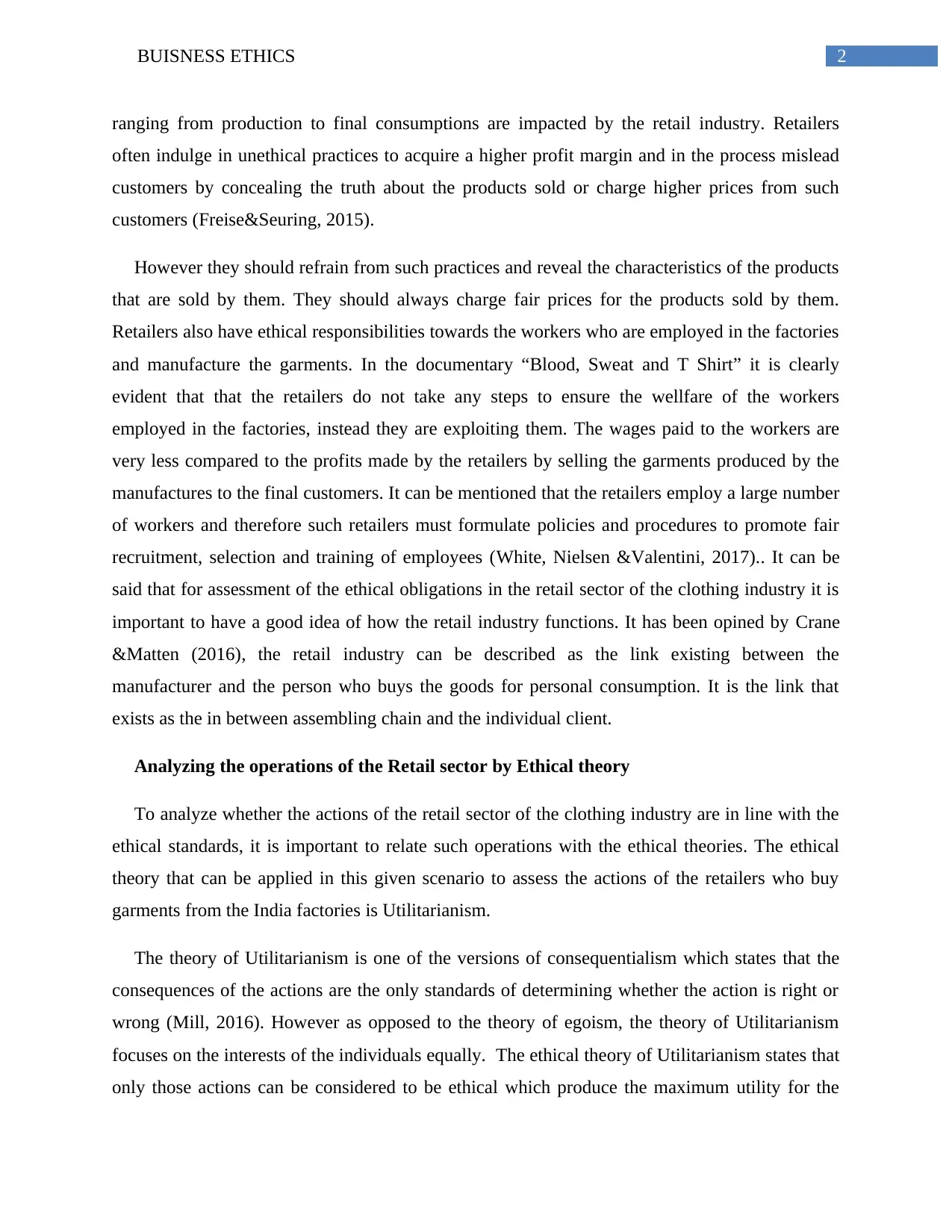
2BUISNESS ETHICS
ranging from production to final consumptions are impacted by the retail industry. Retailers
often indulge in unethical practices to acquire a higher profit margin and in the process mislead
customers by concealing the truth about the products sold or charge higher prices from such
customers (Freise&Seuring, 2015).
However they should refrain from such practices and reveal the characteristics of the products
that are sold by them. They should always charge fair prices for the products sold by them.
Retailers also have ethical responsibilities towards the workers who are employed in the factories
and manufacture the garments. In the documentary “Blood, Sweat and T Shirt” it is clearly
evident that that the retailers do not take any steps to ensure the wellfare of the workers
employed in the factories, instead they are exploiting them. The wages paid to the workers are
very less compared to the profits made by the retailers by selling the garments produced by the
manufactures to the final customers. It can be mentioned that the retailers employ a large number
of workers and therefore such retailers must formulate policies and procedures to promote fair
recruitment, selection and training of employees (White, Nielsen &Valentini, 2017).. It can be
said that for assessment of the ethical obligations in the retail sector of the clothing industry it is
important to have a good idea of how the retail industry functions. It has been opined by Crane
&Matten (2016), the retail industry can be described as the link existing between the
manufacturer and the person who buys the goods for personal consumption. It is the link that
exists as the in between assembling chain and the individual client.
Analyzing the operations of the Retail sector by Ethical theory
To analyze whether the actions of the retail sector of the clothing industry are in line with the
ethical standards, it is important to relate such operations with the ethical theories. The ethical
theory that can be applied in this given scenario to assess the actions of the retailers who buy
garments from the India factories is Utilitarianism.
The theory of Utilitarianism is one of the versions of consequentialism which states that the
consequences of the actions are the only standards of determining whether the action is right or
wrong (Mill, 2016). However as opposed to the theory of egoism, the theory of Utilitarianism
focuses on the interests of the individuals equally. The ethical theory of Utilitarianism states that
only those actions can be considered to be ethical which produce the maximum utility for the
ranging from production to final consumptions are impacted by the retail industry. Retailers
often indulge in unethical practices to acquire a higher profit margin and in the process mislead
customers by concealing the truth about the products sold or charge higher prices from such
customers (Freise&Seuring, 2015).
However they should refrain from such practices and reveal the characteristics of the products
that are sold by them. They should always charge fair prices for the products sold by them.
Retailers also have ethical responsibilities towards the workers who are employed in the factories
and manufacture the garments. In the documentary “Blood, Sweat and T Shirt” it is clearly
evident that that the retailers do not take any steps to ensure the wellfare of the workers
employed in the factories, instead they are exploiting them. The wages paid to the workers are
very less compared to the profits made by the retailers by selling the garments produced by the
manufactures to the final customers. It can be mentioned that the retailers employ a large number
of workers and therefore such retailers must formulate policies and procedures to promote fair
recruitment, selection and training of employees (White, Nielsen &Valentini, 2017).. It can be
said that for assessment of the ethical obligations in the retail sector of the clothing industry it is
important to have a good idea of how the retail industry functions. It has been opined by Crane
&Matten (2016), the retail industry can be described as the link existing between the
manufacturer and the person who buys the goods for personal consumption. It is the link that
exists as the in between assembling chain and the individual client.
Analyzing the operations of the Retail sector by Ethical theory
To analyze whether the actions of the retail sector of the clothing industry are in line with the
ethical standards, it is important to relate such operations with the ethical theories. The ethical
theory that can be applied in this given scenario to assess the actions of the retailers who buy
garments from the India factories is Utilitarianism.
The theory of Utilitarianism is one of the versions of consequentialism which states that the
consequences of the actions are the only standards of determining whether the action is right or
wrong (Mill, 2016). However as opposed to the theory of egoism, the theory of Utilitarianism
focuses on the interests of the individuals equally. The ethical theory of Utilitarianism states that
only those actions can be considered to be ethical which produce the maximum utility for the
⊘ This is a preview!⊘
Do you want full access?
Subscribe today to unlock all pages.

Trusted by 1+ million students worldwide
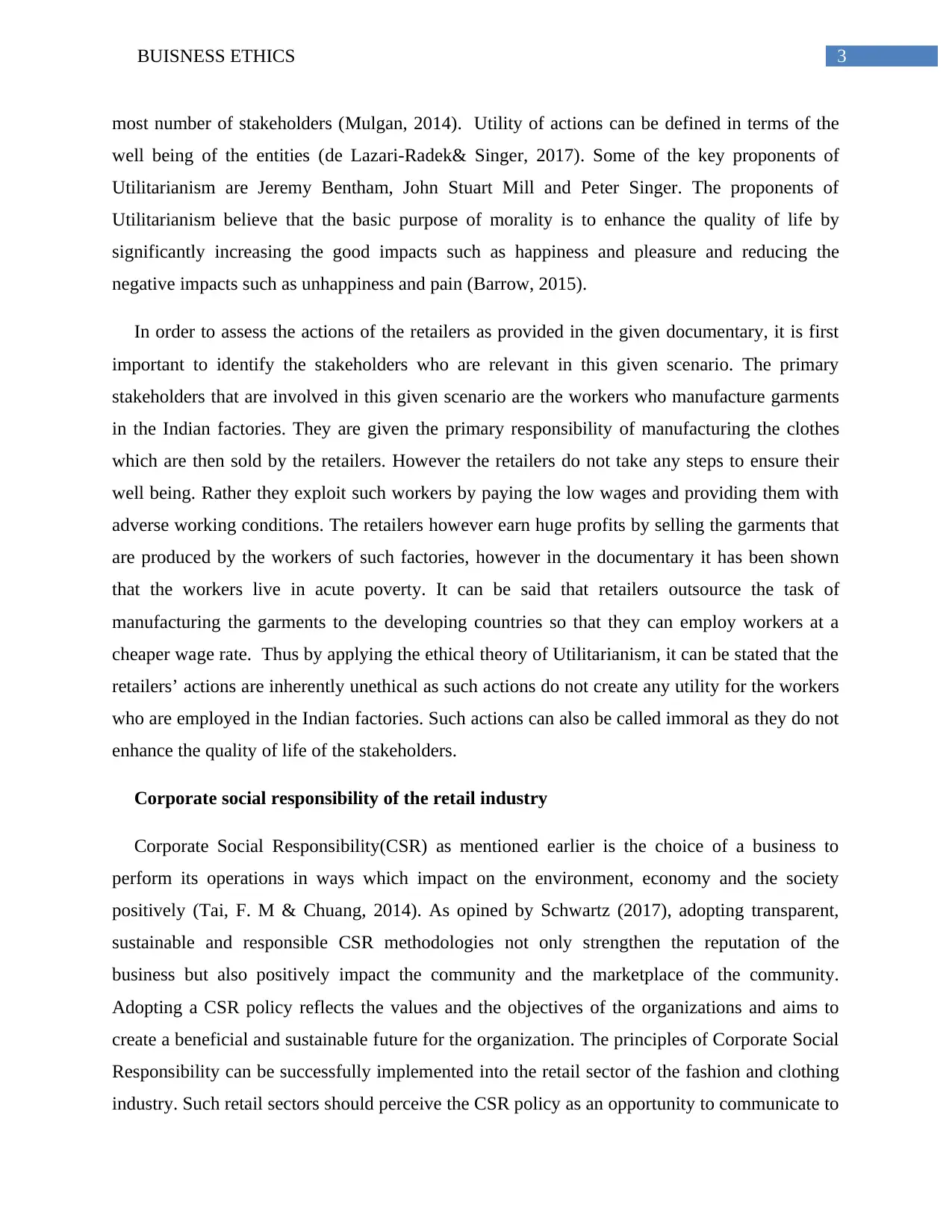
3BUISNESS ETHICS
most number of stakeholders (Mulgan, 2014). Utility of actions can be defined in terms of the
well being of the entities (de Lazari-Radek& Singer, 2017). Some of the key proponents of
Utilitarianism are Jeremy Bentham, John Stuart Mill and Peter Singer. The proponents of
Utilitarianism believe that the basic purpose of morality is to enhance the quality of life by
significantly increasing the good impacts such as happiness and pleasure and reducing the
negative impacts such as unhappiness and pain (Barrow, 2015).
In order to assess the actions of the retailers as provided in the given documentary, it is first
important to identify the stakeholders who are relevant in this given scenario. The primary
stakeholders that are involved in this given scenario are the workers who manufacture garments
in the Indian factories. They are given the primary responsibility of manufacturing the clothes
which are then sold by the retailers. However the retailers do not take any steps to ensure their
well being. Rather they exploit such workers by paying the low wages and providing them with
adverse working conditions. The retailers however earn huge profits by selling the garments that
are produced by the workers of such factories, however in the documentary it has been shown
that the workers live in acute poverty. It can be said that retailers outsource the task of
manufacturing the garments to the developing countries so that they can employ workers at a
cheaper wage rate. Thus by applying the ethical theory of Utilitarianism, it can be stated that the
retailers’ actions are inherently unethical as such actions do not create any utility for the workers
who are employed in the Indian factories. Such actions can also be called immoral as they do not
enhance the quality of life of the stakeholders.
Corporate social responsibility of the retail industry
Corporate Social Responsibility(CSR) as mentioned earlier is the choice of a business to
perform its operations in ways which impact on the environment, economy and the society
positively (Tai, F. M & Chuang, 2014). As opined by Schwartz (2017), adopting transparent,
sustainable and responsible CSR methodologies not only strengthen the reputation of the
business but also positively impact the community and the marketplace of the community.
Adopting a CSR policy reflects the values and the objectives of the organizations and aims to
create a beneficial and sustainable future for the organization. The principles of Corporate Social
Responsibility can be successfully implemented into the retail sector of the fashion and clothing
industry. Such retail sectors should perceive the CSR policy as an opportunity to communicate to
most number of stakeholders (Mulgan, 2014). Utility of actions can be defined in terms of the
well being of the entities (de Lazari-Radek& Singer, 2017). Some of the key proponents of
Utilitarianism are Jeremy Bentham, John Stuart Mill and Peter Singer. The proponents of
Utilitarianism believe that the basic purpose of morality is to enhance the quality of life by
significantly increasing the good impacts such as happiness and pleasure and reducing the
negative impacts such as unhappiness and pain (Barrow, 2015).
In order to assess the actions of the retailers as provided in the given documentary, it is first
important to identify the stakeholders who are relevant in this given scenario. The primary
stakeholders that are involved in this given scenario are the workers who manufacture garments
in the Indian factories. They are given the primary responsibility of manufacturing the clothes
which are then sold by the retailers. However the retailers do not take any steps to ensure their
well being. Rather they exploit such workers by paying the low wages and providing them with
adverse working conditions. The retailers however earn huge profits by selling the garments that
are produced by the workers of such factories, however in the documentary it has been shown
that the workers live in acute poverty. It can be said that retailers outsource the task of
manufacturing the garments to the developing countries so that they can employ workers at a
cheaper wage rate. Thus by applying the ethical theory of Utilitarianism, it can be stated that the
retailers’ actions are inherently unethical as such actions do not create any utility for the workers
who are employed in the Indian factories. Such actions can also be called immoral as they do not
enhance the quality of life of the stakeholders.
Corporate social responsibility of the retail industry
Corporate Social Responsibility(CSR) as mentioned earlier is the choice of a business to
perform its operations in ways which impact on the environment, economy and the society
positively (Tai, F. M & Chuang, 2014). As opined by Schwartz (2017), adopting transparent,
sustainable and responsible CSR methodologies not only strengthen the reputation of the
business but also positively impact the community and the marketplace of the community.
Adopting a CSR policy reflects the values and the objectives of the organizations and aims to
create a beneficial and sustainable future for the organization. The principles of Corporate Social
Responsibility can be successfully implemented into the retail sector of the fashion and clothing
industry. Such retail sectors should perceive the CSR policy as an opportunity to communicate to
Paraphrase This Document
Need a fresh take? Get an instant paraphrase of this document with our AI Paraphraser
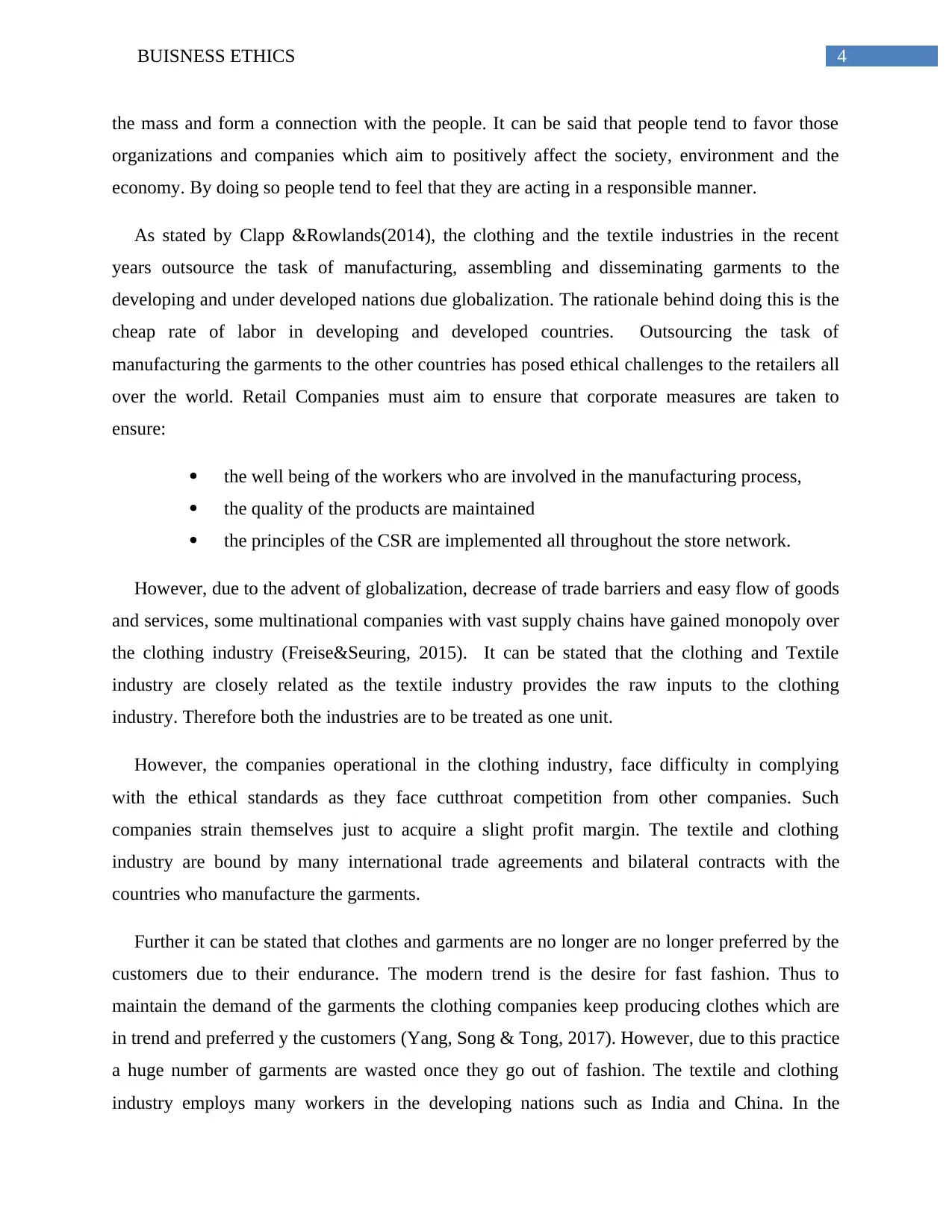
4BUISNESS ETHICS
the mass and form a connection with the people. It can be said that people tend to favor those
organizations and companies which aim to positively affect the society, environment and the
economy. By doing so people tend to feel that they are acting in a responsible manner.
As stated by Clapp &Rowlands(2014), the clothing and the textile industries in the recent
years outsource the task of manufacturing, assembling and disseminating garments to the
developing and under developed nations due globalization. The rationale behind doing this is the
cheap rate of labor in developing and developed countries. Outsourcing the task of
manufacturing the garments to the other countries has posed ethical challenges to the retailers all
over the world. Retail Companies must aim to ensure that corporate measures are taken to
ensure:
the well being of the workers who are involved in the manufacturing process,
the quality of the products are maintained
the principles of the CSR are implemented all throughout the store network.
However, due to the advent of globalization, decrease of trade barriers and easy flow of goods
and services, some multinational companies with vast supply chains have gained monopoly over
the clothing industry (Freise&Seuring, 2015). It can be stated that the clothing and Textile
industry are closely related as the textile industry provides the raw inputs to the clothing
industry. Therefore both the industries are to be treated as one unit.
However, the companies operational in the clothing industry, face difficulty in complying
with the ethical standards as they face cutthroat competition from other companies. Such
companies strain themselves just to acquire a slight profit margin. The textile and clothing
industry are bound by many international trade agreements and bilateral contracts with the
countries who manufacture the garments.
Further it can be stated that clothes and garments are no longer are no longer preferred by the
customers due to their endurance. The modern trend is the desire for fast fashion. Thus to
maintain the demand of the garments the clothing companies keep producing clothes which are
in trend and preferred y the customers (Yang, Song & Tong, 2017). However, due to this practice
a huge number of garments are wasted once they go out of fashion. The textile and clothing
industry employs many workers in the developing nations such as India and China. In the
the mass and form a connection with the people. It can be said that people tend to favor those
organizations and companies which aim to positively affect the society, environment and the
economy. By doing so people tend to feel that they are acting in a responsible manner.
As stated by Clapp &Rowlands(2014), the clothing and the textile industries in the recent
years outsource the task of manufacturing, assembling and disseminating garments to the
developing and under developed nations due globalization. The rationale behind doing this is the
cheap rate of labor in developing and developed countries. Outsourcing the task of
manufacturing the garments to the other countries has posed ethical challenges to the retailers all
over the world. Retail Companies must aim to ensure that corporate measures are taken to
ensure:
the well being of the workers who are involved in the manufacturing process,
the quality of the products are maintained
the principles of the CSR are implemented all throughout the store network.
However, due to the advent of globalization, decrease of trade barriers and easy flow of goods
and services, some multinational companies with vast supply chains have gained monopoly over
the clothing industry (Freise&Seuring, 2015). It can be stated that the clothing and Textile
industry are closely related as the textile industry provides the raw inputs to the clothing
industry. Therefore both the industries are to be treated as one unit.
However, the companies operational in the clothing industry, face difficulty in complying
with the ethical standards as they face cutthroat competition from other companies. Such
companies strain themselves just to acquire a slight profit margin. The textile and clothing
industry are bound by many international trade agreements and bilateral contracts with the
countries who manufacture the garments.
Further it can be stated that clothes and garments are no longer are no longer preferred by the
customers due to their endurance. The modern trend is the desire for fast fashion. Thus to
maintain the demand of the garments the clothing companies keep producing clothes which are
in trend and preferred y the customers (Yang, Song & Tong, 2017). However, due to this practice
a huge number of garments are wasted once they go out of fashion. The textile and clothing
industry employs many workers in the developing nations such as India and China. In the
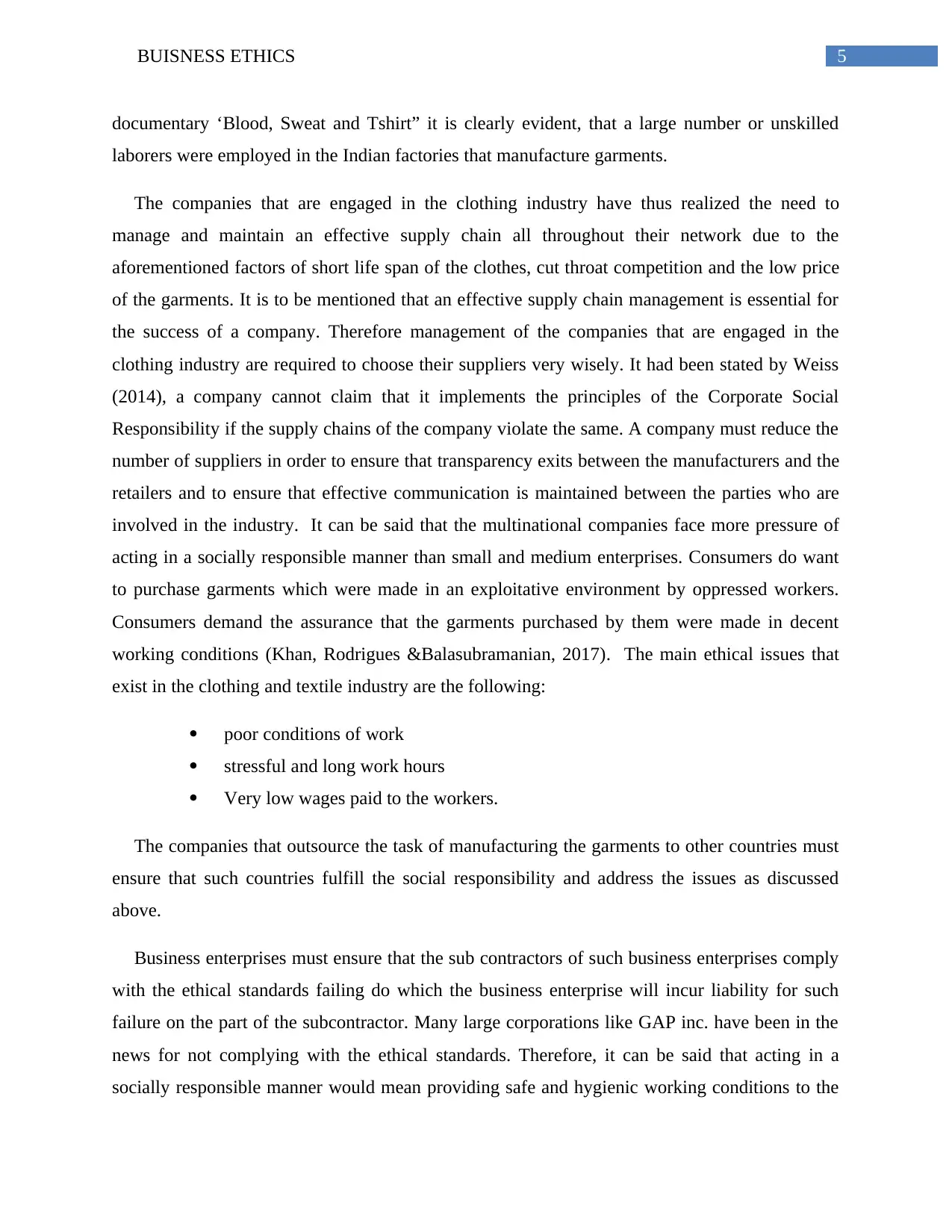
5BUISNESS ETHICS
documentary ‘Blood, Sweat and Tshirt” it is clearly evident, that a large number or unskilled
laborers were employed in the Indian factories that manufacture garments.
The companies that are engaged in the clothing industry have thus realized the need to
manage and maintain an effective supply chain all throughout their network due to the
aforementioned factors of short life span of the clothes, cut throat competition and the low price
of the garments. It is to be mentioned that an effective supply chain management is essential for
the success of a company. Therefore management of the companies that are engaged in the
clothing industry are required to choose their suppliers very wisely. It had been stated by Weiss
(2014), a company cannot claim that it implements the principles of the Corporate Social
Responsibility if the supply chains of the company violate the same. A company must reduce the
number of suppliers in order to ensure that transparency exits between the manufacturers and the
retailers and to ensure that effective communication is maintained between the parties who are
involved in the industry. It can be said that the multinational companies face more pressure of
acting in a socially responsible manner than small and medium enterprises. Consumers do want
to purchase garments which were made in an exploitative environment by oppressed workers.
Consumers demand the assurance that the garments purchased by them were made in decent
working conditions (Khan, Rodrigues &Balasubramanian, 2017). The main ethical issues that
exist in the clothing and textile industry are the following:
poor conditions of work
stressful and long work hours
Very low wages paid to the workers.
The companies that outsource the task of manufacturing the garments to other countries must
ensure that such countries fulfill the social responsibility and address the issues as discussed
above.
Business enterprises must ensure that the sub contractors of such business enterprises comply
with the ethical standards failing do which the business enterprise will incur liability for such
failure on the part of the subcontractor. Many large corporations like GAP inc. have been in the
news for not complying with the ethical standards. Therefore, it can be said that acting in a
socially responsible manner would mean providing safe and hygienic working conditions to the
documentary ‘Blood, Sweat and Tshirt” it is clearly evident, that a large number or unskilled
laborers were employed in the Indian factories that manufacture garments.
The companies that are engaged in the clothing industry have thus realized the need to
manage and maintain an effective supply chain all throughout their network due to the
aforementioned factors of short life span of the clothes, cut throat competition and the low price
of the garments. It is to be mentioned that an effective supply chain management is essential for
the success of a company. Therefore management of the companies that are engaged in the
clothing industry are required to choose their suppliers very wisely. It had been stated by Weiss
(2014), a company cannot claim that it implements the principles of the Corporate Social
Responsibility if the supply chains of the company violate the same. A company must reduce the
number of suppliers in order to ensure that transparency exits between the manufacturers and the
retailers and to ensure that effective communication is maintained between the parties who are
involved in the industry. It can be said that the multinational companies face more pressure of
acting in a socially responsible manner than small and medium enterprises. Consumers do want
to purchase garments which were made in an exploitative environment by oppressed workers.
Consumers demand the assurance that the garments purchased by them were made in decent
working conditions (Khan, Rodrigues &Balasubramanian, 2017). The main ethical issues that
exist in the clothing and textile industry are the following:
poor conditions of work
stressful and long work hours
Very low wages paid to the workers.
The companies that outsource the task of manufacturing the garments to other countries must
ensure that such countries fulfill the social responsibility and address the issues as discussed
above.
Business enterprises must ensure that the sub contractors of such business enterprises comply
with the ethical standards failing do which the business enterprise will incur liability for such
failure on the part of the subcontractor. Many large corporations like GAP inc. have been in the
news for not complying with the ethical standards. Therefore, it can be said that acting in a
socially responsible manner would mean providing safe and hygienic working conditions to the
⊘ This is a preview!⊘
Do you want full access?
Subscribe today to unlock all pages.

Trusted by 1+ million students worldwide
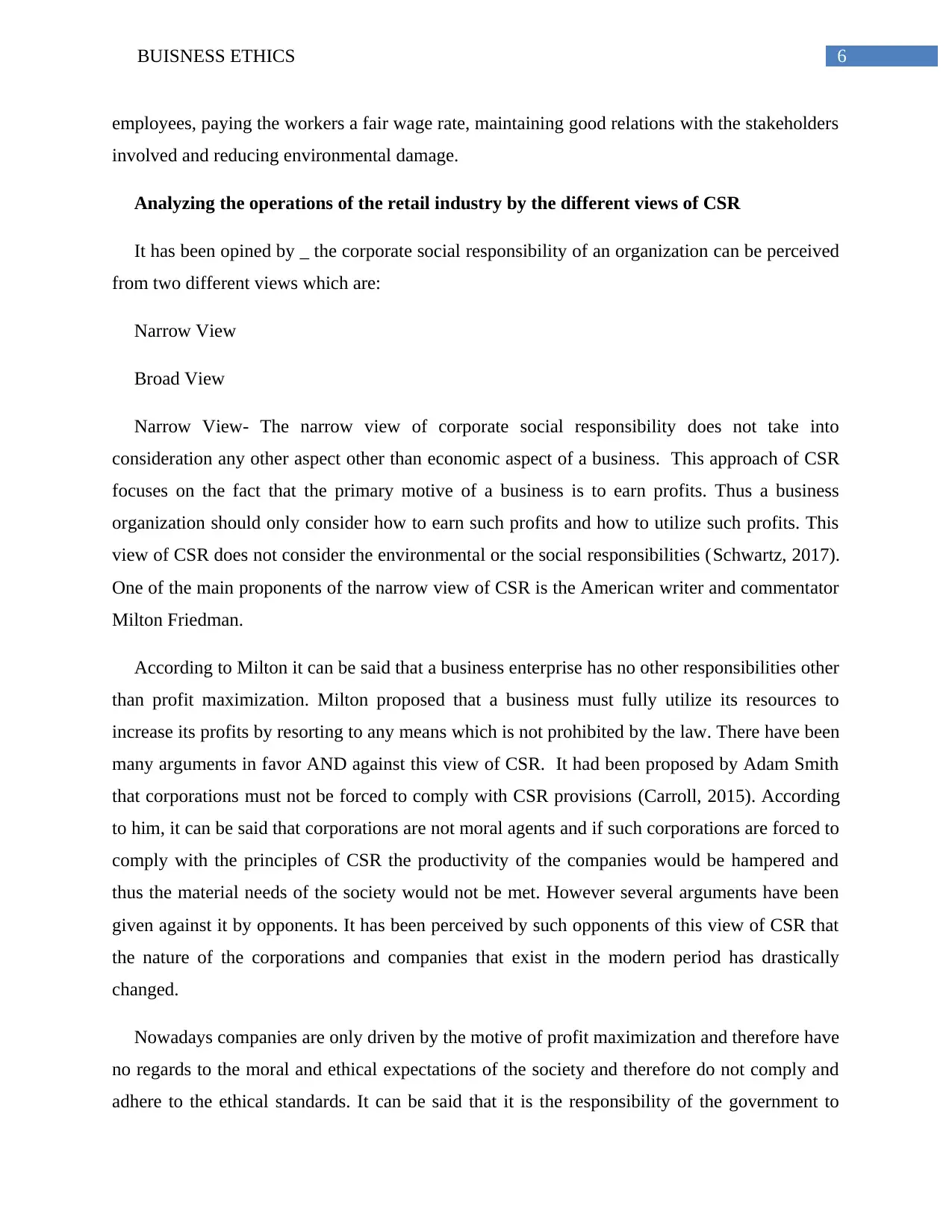
6BUISNESS ETHICS
employees, paying the workers a fair wage rate, maintaining good relations with the stakeholders
involved and reducing environmental damage.
Analyzing the operations of the retail industry by the different views of CSR
It has been opined by _ the corporate social responsibility of an organization can be perceived
from two different views which are:
Narrow View
Broad View
Narrow View- The narrow view of corporate social responsibility does not take into
consideration any other aspect other than economic aspect of a business. This approach of CSR
focuses on the fact that the primary motive of a business is to earn profits. Thus a business
organization should only consider how to earn such profits and how to utilize such profits. This
view of CSR does not consider the environmental or the social responsibilities (Schwartz, 2017).
One of the main proponents of the narrow view of CSR is the American writer and commentator
Milton Friedman.
According to Milton it can be said that a business enterprise has no other responsibilities other
than profit maximization. Milton proposed that a business must fully utilize its resources to
increase its profits by resorting to any means which is not prohibited by the law. There have been
many arguments in favor AND against this view of CSR. It had been proposed by Adam Smith
that corporations must not be forced to comply with CSR provisions (Carroll, 2015). According
to him, it can be said that corporations are not moral agents and if such corporations are forced to
comply with the principles of CSR the productivity of the companies would be hampered and
thus the material needs of the society would not be met. However several arguments have been
given against it by opponents. It has been perceived by such opponents of this view of CSR that
the nature of the corporations and companies that exist in the modern period has drastically
changed.
Nowadays companies are only driven by the motive of profit maximization and therefore have
no regards to the moral and ethical expectations of the society and therefore do not comply and
adhere to the ethical standards. It can be said that it is the responsibility of the government to
employees, paying the workers a fair wage rate, maintaining good relations with the stakeholders
involved and reducing environmental damage.
Analyzing the operations of the retail industry by the different views of CSR
It has been opined by _ the corporate social responsibility of an organization can be perceived
from two different views which are:
Narrow View
Broad View
Narrow View- The narrow view of corporate social responsibility does not take into
consideration any other aspect other than economic aspect of a business. This approach of CSR
focuses on the fact that the primary motive of a business is to earn profits. Thus a business
organization should only consider how to earn such profits and how to utilize such profits. This
view of CSR does not consider the environmental or the social responsibilities (Schwartz, 2017).
One of the main proponents of the narrow view of CSR is the American writer and commentator
Milton Friedman.
According to Milton it can be said that a business enterprise has no other responsibilities other
than profit maximization. Milton proposed that a business must fully utilize its resources to
increase its profits by resorting to any means which is not prohibited by the law. There have been
many arguments in favor AND against this view of CSR. It had been proposed by Adam Smith
that corporations must not be forced to comply with CSR provisions (Carroll, 2015). According
to him, it can be said that corporations are not moral agents and if such corporations are forced to
comply with the principles of CSR the productivity of the companies would be hampered and
thus the material needs of the society would not be met. However several arguments have been
given against it by opponents. It has been perceived by such opponents of this view of CSR that
the nature of the corporations and companies that exist in the modern period has drastically
changed.
Nowadays companies are only driven by the motive of profit maximization and therefore have
no regards to the moral and ethical expectations of the society and therefore do not comply and
adhere to the ethical standards. It can be said that it is the responsibility of the government to
Paraphrase This Document
Need a fresh take? Get an instant paraphrase of this document with our AI Paraphraser
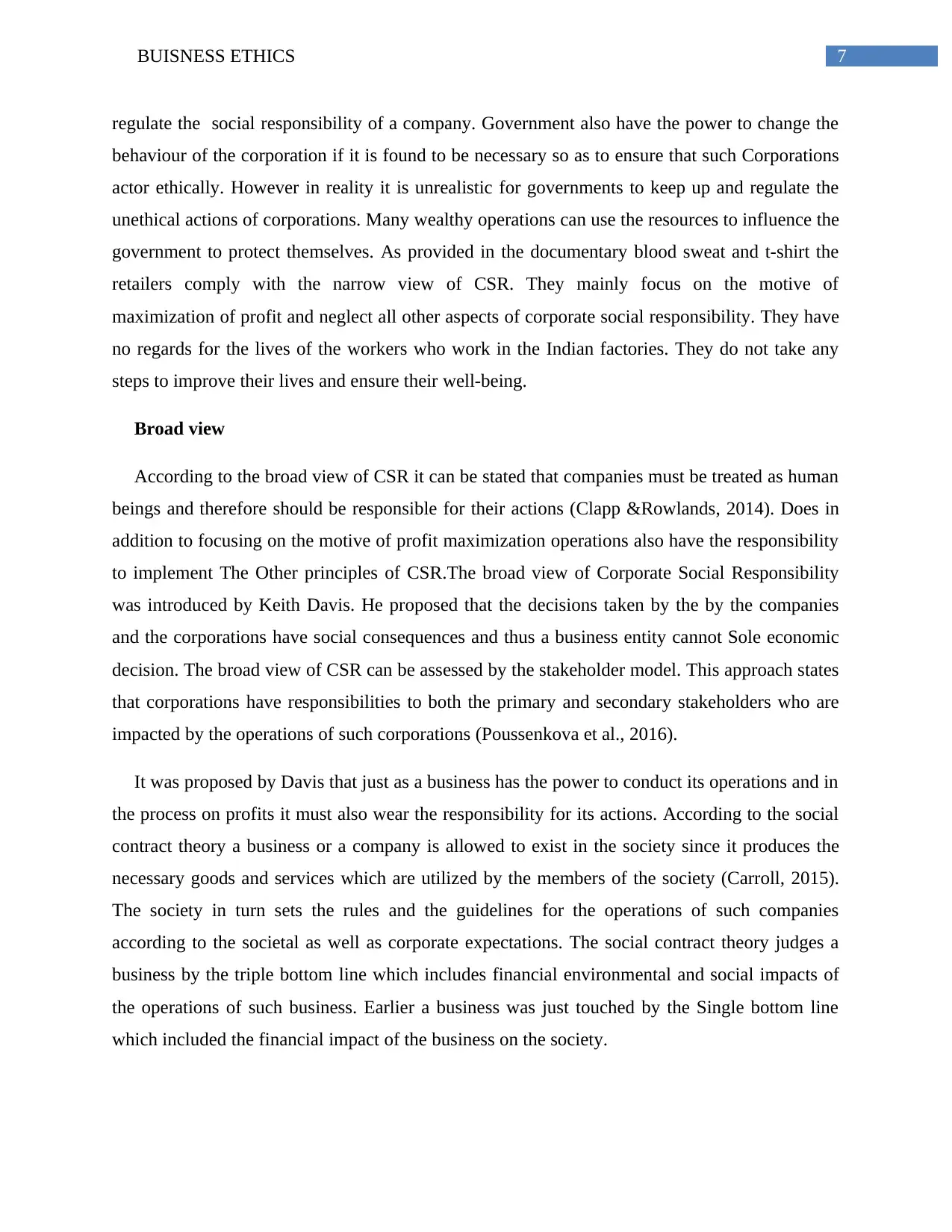
7BUISNESS ETHICS
regulate the social responsibility of a company. Government also have the power to change the
behaviour of the corporation if it is found to be necessary so as to ensure that such Corporations
actor ethically. However in reality it is unrealistic for governments to keep up and regulate the
unethical actions of corporations. Many wealthy operations can use the resources to influence the
government to protect themselves. As provided in the documentary blood sweat and t-shirt the
retailers comply with the narrow view of CSR. They mainly focus on the motive of
maximization of profit and neglect all other aspects of corporate social responsibility. They have
no regards for the lives of the workers who work in the Indian factories. They do not take any
steps to improve their lives and ensure their well-being.
Broad view
According to the broad view of CSR it can be stated that companies must be treated as human
beings and therefore should be responsible for their actions (Clapp &Rowlands, 2014). Does in
addition to focusing on the motive of profit maximization operations also have the responsibility
to implement The Other principles of CSR.The broad view of Corporate Social Responsibility
was introduced by Keith Davis. He proposed that the decisions taken by the by the companies
and the corporations have social consequences and thus a business entity cannot Sole economic
decision. The broad view of CSR can be assessed by the stakeholder model. This approach states
that corporations have responsibilities to both the primary and secondary stakeholders who are
impacted by the operations of such corporations (Poussenkova et al., 2016).
It was proposed by Davis that just as a business has the power to conduct its operations and in
the process on profits it must also wear the responsibility for its actions. According to the social
contract theory a business or a company is allowed to exist in the society since it produces the
necessary goods and services which are utilized by the members of the society (Carroll, 2015).
The society in turn sets the rules and the guidelines for the operations of such companies
according to the societal as well as corporate expectations. The social contract theory judges a
business by the triple bottom line which includes financial environmental and social impacts of
the operations of such business. Earlier a business was just touched by the Single bottom line
which included the financial impact of the business on the society.
regulate the social responsibility of a company. Government also have the power to change the
behaviour of the corporation if it is found to be necessary so as to ensure that such Corporations
actor ethically. However in reality it is unrealistic for governments to keep up and regulate the
unethical actions of corporations. Many wealthy operations can use the resources to influence the
government to protect themselves. As provided in the documentary blood sweat and t-shirt the
retailers comply with the narrow view of CSR. They mainly focus on the motive of
maximization of profit and neglect all other aspects of corporate social responsibility. They have
no regards for the lives of the workers who work in the Indian factories. They do not take any
steps to improve their lives and ensure their well-being.
Broad view
According to the broad view of CSR it can be stated that companies must be treated as human
beings and therefore should be responsible for their actions (Clapp &Rowlands, 2014). Does in
addition to focusing on the motive of profit maximization operations also have the responsibility
to implement The Other principles of CSR.The broad view of Corporate Social Responsibility
was introduced by Keith Davis. He proposed that the decisions taken by the by the companies
and the corporations have social consequences and thus a business entity cannot Sole economic
decision. The broad view of CSR can be assessed by the stakeholder model. This approach states
that corporations have responsibilities to both the primary and secondary stakeholders who are
impacted by the operations of such corporations (Poussenkova et al., 2016).
It was proposed by Davis that just as a business has the power to conduct its operations and in
the process on profits it must also wear the responsibility for its actions. According to the social
contract theory a business or a company is allowed to exist in the society since it produces the
necessary goods and services which are utilized by the members of the society (Carroll, 2015).
The society in turn sets the rules and the guidelines for the operations of such companies
according to the societal as well as corporate expectations. The social contract theory judges a
business by the triple bottom line which includes financial environmental and social impacts of
the operations of such business. Earlier a business was just touched by the Single bottom line
which included the financial impact of the business on the society.
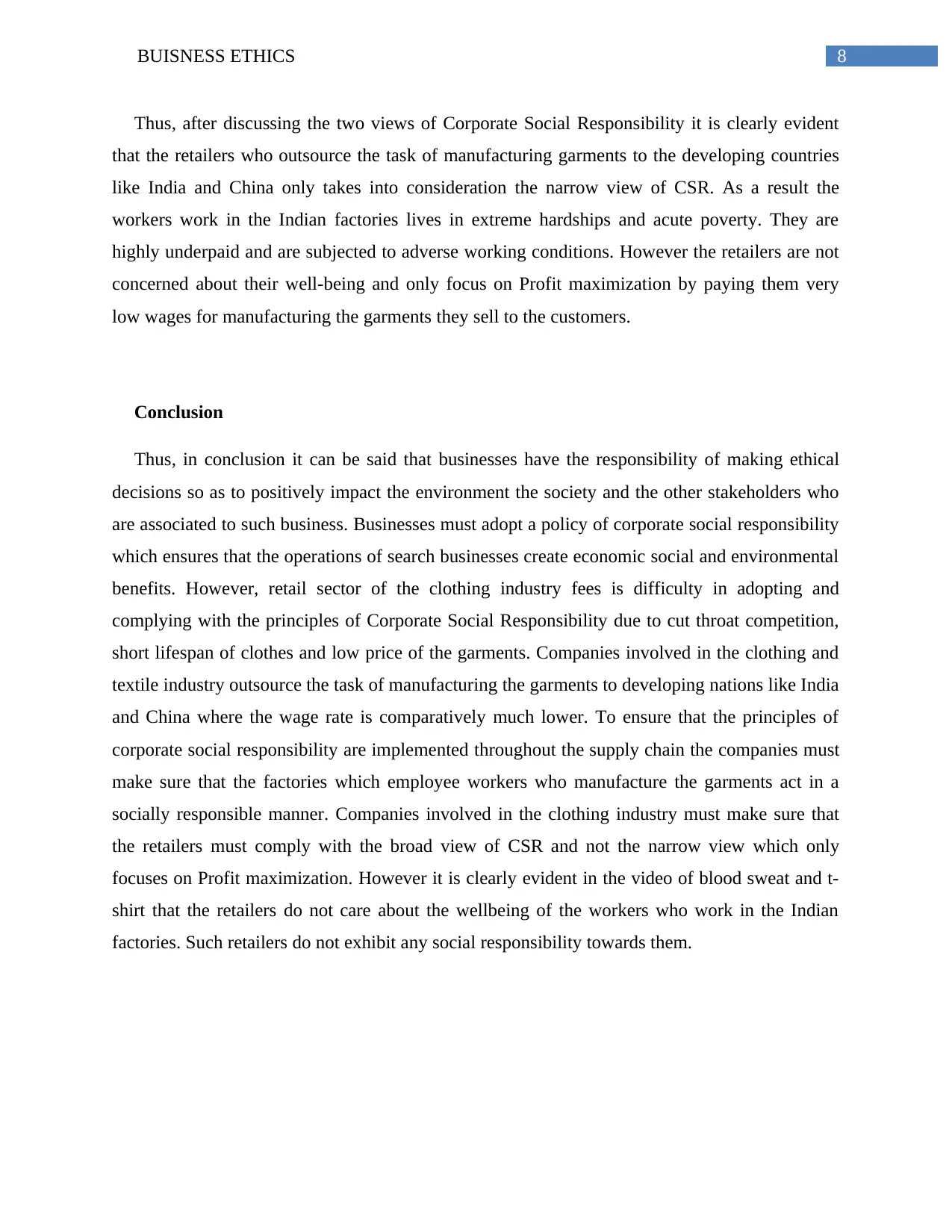
8BUISNESS ETHICS
Thus, after discussing the two views of Corporate Social Responsibility it is clearly evident
that the retailers who outsource the task of manufacturing garments to the developing countries
like India and China only takes into consideration the narrow view of CSR. As a result the
workers work in the Indian factories lives in extreme hardships and acute poverty. They are
highly underpaid and are subjected to adverse working conditions. However the retailers are not
concerned about their well-being and only focus on Profit maximization by paying them very
low wages for manufacturing the garments they sell to the customers.
Conclusion
Thus, in conclusion it can be said that businesses have the responsibility of making ethical
decisions so as to positively impact the environment the society and the other stakeholders who
are associated to such business. Businesses must adopt a policy of corporate social responsibility
which ensures that the operations of search businesses create economic social and environmental
benefits. However, retail sector of the clothing industry fees is difficulty in adopting and
complying with the principles of Corporate Social Responsibility due to cut throat competition,
short lifespan of clothes and low price of the garments. Companies involved in the clothing and
textile industry outsource the task of manufacturing the garments to developing nations like India
and China where the wage rate is comparatively much lower. To ensure that the principles of
corporate social responsibility are implemented throughout the supply chain the companies must
make sure that the factories which employee workers who manufacture the garments act in a
socially responsible manner. Companies involved in the clothing industry must make sure that
the retailers must comply with the broad view of CSR and not the narrow view which only
focuses on Profit maximization. However it is clearly evident in the video of blood sweat and t-
shirt that the retailers do not care about the wellbeing of the workers who work in the Indian
factories. Such retailers do not exhibit any social responsibility towards them.
Thus, after discussing the two views of Corporate Social Responsibility it is clearly evident
that the retailers who outsource the task of manufacturing garments to the developing countries
like India and China only takes into consideration the narrow view of CSR. As a result the
workers work in the Indian factories lives in extreme hardships and acute poverty. They are
highly underpaid and are subjected to adverse working conditions. However the retailers are not
concerned about their well-being and only focus on Profit maximization by paying them very
low wages for manufacturing the garments they sell to the customers.
Conclusion
Thus, in conclusion it can be said that businesses have the responsibility of making ethical
decisions so as to positively impact the environment the society and the other stakeholders who
are associated to such business. Businesses must adopt a policy of corporate social responsibility
which ensures that the operations of search businesses create economic social and environmental
benefits. However, retail sector of the clothing industry fees is difficulty in adopting and
complying with the principles of Corporate Social Responsibility due to cut throat competition,
short lifespan of clothes and low price of the garments. Companies involved in the clothing and
textile industry outsource the task of manufacturing the garments to developing nations like India
and China where the wage rate is comparatively much lower. To ensure that the principles of
corporate social responsibility are implemented throughout the supply chain the companies must
make sure that the factories which employee workers who manufacture the garments act in a
socially responsible manner. Companies involved in the clothing industry must make sure that
the retailers must comply with the broad view of CSR and not the narrow view which only
focuses on Profit maximization. However it is clearly evident in the video of blood sweat and t-
shirt that the retailers do not care about the wellbeing of the workers who work in the Indian
factories. Such retailers do not exhibit any social responsibility towards them.
⊘ This is a preview!⊘
Do you want full access?
Subscribe today to unlock all pages.

Trusted by 1+ million students worldwide
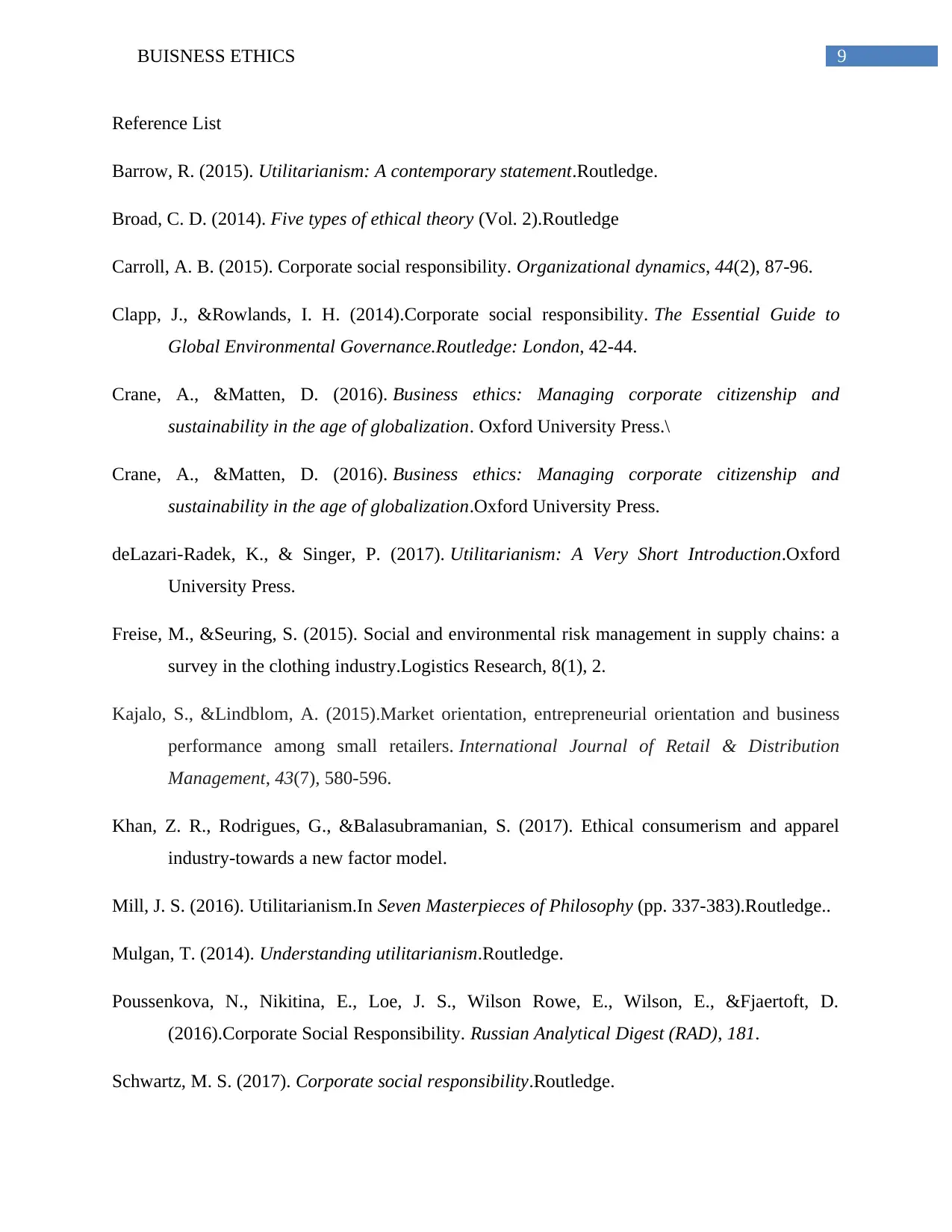
9BUISNESS ETHICS
Reference List
Barrow, R. (2015). Utilitarianism: A contemporary statement.Routledge.
Broad, C. D. (2014). Five types of ethical theory (Vol. 2).Routledge
Carroll, A. B. (2015). Corporate social responsibility. Organizational dynamics, 44(2), 87-96.
Clapp, J., &Rowlands, I. H. (2014).Corporate social responsibility. The Essential Guide to
Global Environmental Governance.Routledge: London, 42-44.
Crane, A., &Matten, D. (2016). Business ethics: Managing corporate citizenship and
sustainability in the age of globalization. Oxford University Press.\
Crane, A., &Matten, D. (2016). Business ethics: Managing corporate citizenship and
sustainability in the age of globalization.Oxford University Press.
deLazari-Radek, K., & Singer, P. (2017). Utilitarianism: A Very Short Introduction.Oxford
University Press.
Freise, M., &Seuring, S. (2015). Social and environmental risk management in supply chains: a
survey in the clothing industry.Logistics Research, 8(1), 2.
Kajalo, S., &Lindblom, A. (2015).Market orientation, entrepreneurial orientation and business
performance among small retailers. International Journal of Retail & Distribution
Management, 43(7), 580-596.
Khan, Z. R., Rodrigues, G., &Balasubramanian, S. (2017). Ethical consumerism and apparel
industry-towards a new factor model.
Mill, J. S. (2016). Utilitarianism.In Seven Masterpieces of Philosophy (pp. 337-383).Routledge..
Mulgan, T. (2014). Understanding utilitarianism.Routledge.
Poussenkova, N., Nikitina, E., Loe, J. S., Wilson Rowe, E., Wilson, E., &Fjaertoft, D.
(2016).Corporate Social Responsibility. Russian Analytical Digest (RAD), 181.
Schwartz, M. S. (2017). Corporate social responsibility.Routledge.
Reference List
Barrow, R. (2015). Utilitarianism: A contemporary statement.Routledge.
Broad, C. D. (2014). Five types of ethical theory (Vol. 2).Routledge
Carroll, A. B. (2015). Corporate social responsibility. Organizational dynamics, 44(2), 87-96.
Clapp, J., &Rowlands, I. H. (2014).Corporate social responsibility. The Essential Guide to
Global Environmental Governance.Routledge: London, 42-44.
Crane, A., &Matten, D. (2016). Business ethics: Managing corporate citizenship and
sustainability in the age of globalization. Oxford University Press.\
Crane, A., &Matten, D. (2016). Business ethics: Managing corporate citizenship and
sustainability in the age of globalization.Oxford University Press.
deLazari-Radek, K., & Singer, P. (2017). Utilitarianism: A Very Short Introduction.Oxford
University Press.
Freise, M., &Seuring, S. (2015). Social and environmental risk management in supply chains: a
survey in the clothing industry.Logistics Research, 8(1), 2.
Kajalo, S., &Lindblom, A. (2015).Market orientation, entrepreneurial orientation and business
performance among small retailers. International Journal of Retail & Distribution
Management, 43(7), 580-596.
Khan, Z. R., Rodrigues, G., &Balasubramanian, S. (2017). Ethical consumerism and apparel
industry-towards a new factor model.
Mill, J. S. (2016). Utilitarianism.In Seven Masterpieces of Philosophy (pp. 337-383).Routledge..
Mulgan, T. (2014). Understanding utilitarianism.Routledge.
Poussenkova, N., Nikitina, E., Loe, J. S., Wilson Rowe, E., Wilson, E., &Fjaertoft, D.
(2016).Corporate Social Responsibility. Russian Analytical Digest (RAD), 181.
Schwartz, M. S. (2017). Corporate social responsibility.Routledge.
Paraphrase This Document
Need a fresh take? Get an instant paraphrase of this document with our AI Paraphraser
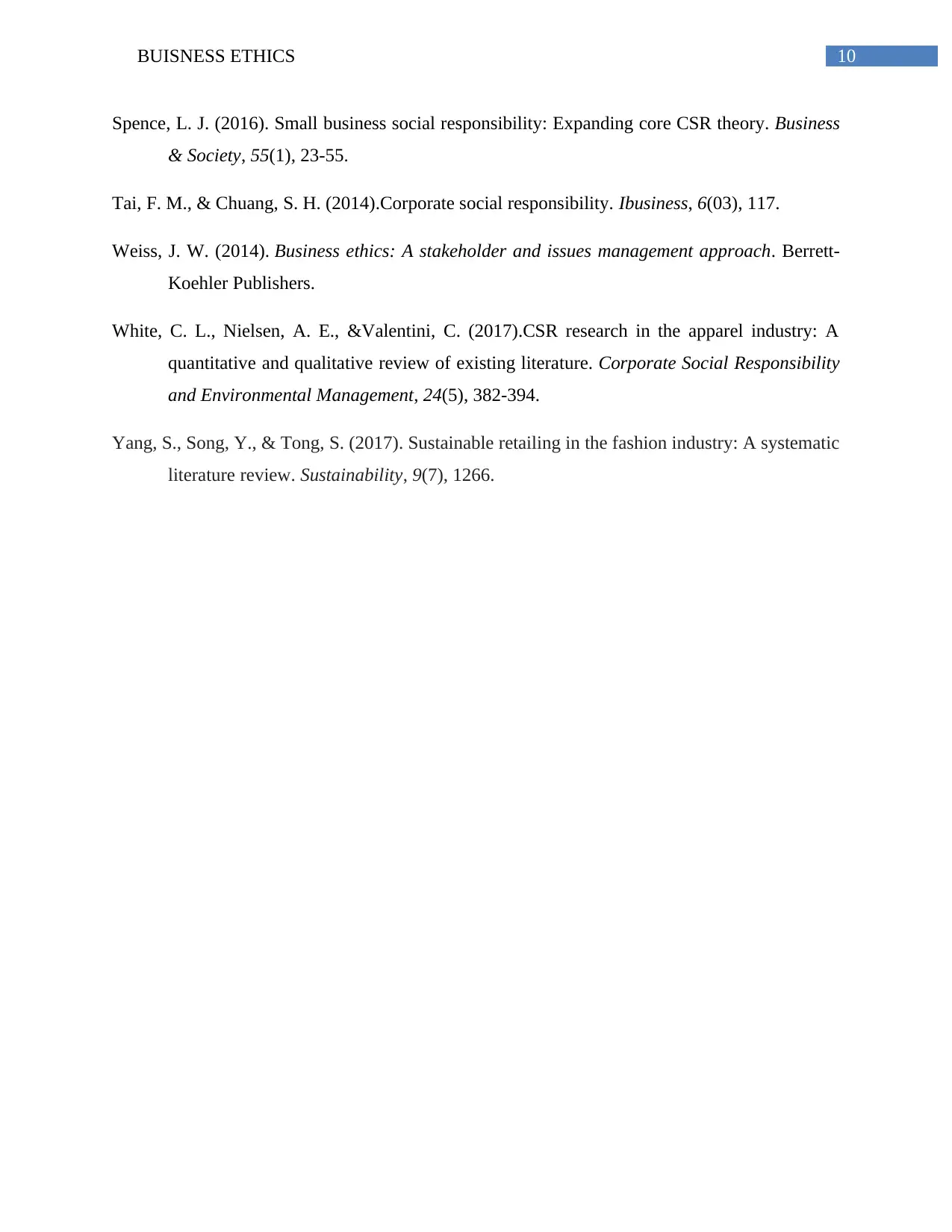
10BUISNESS ETHICS
Spence, L. J. (2016). Small business social responsibility: Expanding core CSR theory. Business
& Society, 55(1), 23-55.
Tai, F. M., & Chuang, S. H. (2014).Corporate social responsibility. Ibusiness, 6(03), 117.
Weiss, J. W. (2014). Business ethics: A stakeholder and issues management approach. Berrett-
Koehler Publishers.
White, C. L., Nielsen, A. E., &Valentini, C. (2017).CSR research in the apparel industry: A
quantitative and qualitative review of existing literature. Corporate Social Responsibility
and Environmental Management, 24(5), 382-394.
Yang, S., Song, Y., & Tong, S. (2017). Sustainable retailing in the fashion industry: A systematic
literature review. Sustainability, 9(7), 1266.
Spence, L. J. (2016). Small business social responsibility: Expanding core CSR theory. Business
& Society, 55(1), 23-55.
Tai, F. M., & Chuang, S. H. (2014).Corporate social responsibility. Ibusiness, 6(03), 117.
Weiss, J. W. (2014). Business ethics: A stakeholder and issues management approach. Berrett-
Koehler Publishers.
White, C. L., Nielsen, A. E., &Valentini, C. (2017).CSR research in the apparel industry: A
quantitative and qualitative review of existing literature. Corporate Social Responsibility
and Environmental Management, 24(5), 382-394.
Yang, S., Song, Y., & Tong, S. (2017). Sustainable retailing in the fashion industry: A systematic
literature review. Sustainability, 9(7), 1266.
1 out of 11
Related Documents
Your All-in-One AI-Powered Toolkit for Academic Success.
+13062052269
info@desklib.com
Available 24*7 on WhatsApp / Email
![[object Object]](/_next/static/media/star-bottom.7253800d.svg)
Unlock your academic potential
Copyright © 2020–2026 A2Z Services. All Rights Reserved. Developed and managed by ZUCOL.





